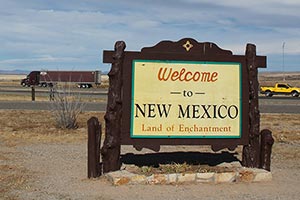New Mexico Proposes Plan to Recover Millions From Tax-Dodging Truckers

The New Mexico Department of Transportation is asking lawmakers to change how weigh stations are managed in an effort to capture as much as $56 million a year that analysts estimate the state is losing to truckers who don’t pay fees to haul their loads across New Mexico roads.
The plan is to staff the state’s ports of entry with Transportation Department employees, relieving state police from the duty, Transportation Secretary Tom Church said in a meeting with lawmakers last week. Advocates of Church’s proposal say it would allow motor transit police, who currently run the weigh stations, to focus on truck inspections and ensuring truckers are complying with the state’s weight-distance tax system.
Officials have known for years that some truck drivers don’t purchase the state’s trucking permit, which levies a fee on vehicles greater than 26,000 pounds and is based on the distance they drive on New Mexico roads. Drivers have had to buy the permits from one of the 19 commercial weigh stations scattered mostly along the state’s borders — and some, rather than wait in line, take the risk of running through the state without a permit.
While Church’s bill would free up Public Safety Department officers to find those truckers without permits, it also would expand an online permitting system, which transportation officials say has boosted the number of permits sold since it became effective last year.
“We just need to make it happen, as a state,” Church told the House Transportation and Public Works Committee. “It’s a bad situation that needs to be improved.”
Many members of the House Transportation and Public Works Committee expressed support Friday for Church’s proposal, saying it would help trucking businesses that already buy permits and pay taxes.
“I’m very glad to hear we’re doing this,” said Rep. Rod Montoya, R-Farmington. “I think it levels the playing field.”
Efforts on Jan. 22 to determine how many state Public Safety officers operate the weigh stations were unsuccessful.
State analysts have not conducted an in-depth study on how much tax revenue the state is losing to scofflaw truckers, but a 2013 Legislative Finance Committee report provides an estimate: between $27 million and $56 million. It adds, though, that the range is subject to a “significant” margin of error.
“I can say, conservatively, we will see $25 million,” Rep. Cathrynn Brown, a Carlsbad Republican and the committee’s chairwoman, said in an interview.
However much money is leaking through the state’s coffers, it’s significant, said Johnny Johnson, managing director of the New Mexico Trucking Association. He believes that assigning police who have been operating the weigh stations to highway patrol will help catch unpermitted trucks, and that shifting management of the stations to the Transportation Department will ensure the stations are well-maintained.
“This is a good program for everybody concerned,” he said during the committee meeting.
The program would begin with a trial period. The Public Safety, Taxation and Revenue, and Transportation departments would each contribute $2 million to operate it. Church said his department also plans to take a $6 million fund balance to repair weigh stations that are rutted and riddled with potholes.
Even if Church’s plan recovers nearly $60 million — a high estimate, officials say — that’s still a fraction of what the department needs. According to state records, the department identified nearly $862 million in construction and maintenance needs this fiscal year, but its budget contains less than half that: about $395 million.
Brown said road and bridge funding shortages are common problem for states.
“I don’t know of any state in the union that does not have a need for more transportation dollars,” she said. “It’s nationwide.”

